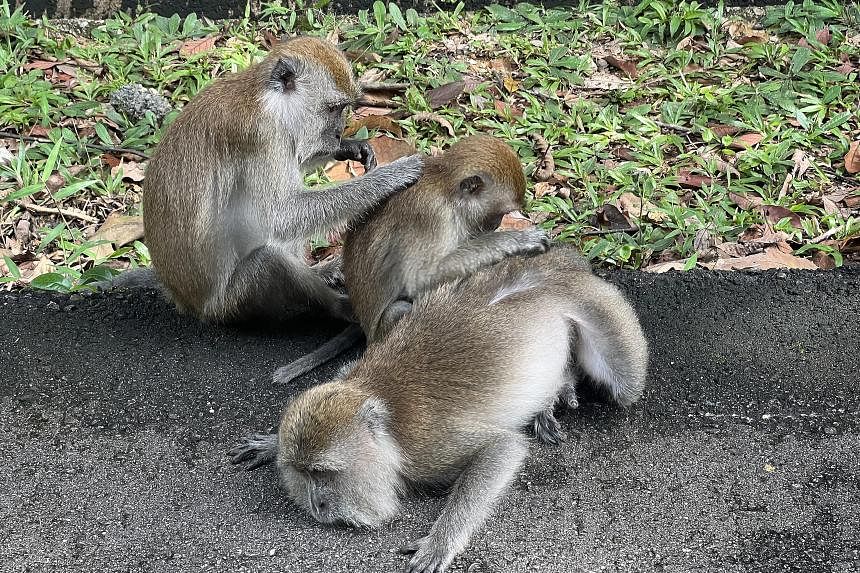SINGAPORE – A 37-year-old man from Hong Kong is in critical condition, having tested positive for the B virus after he was bitten by monkeys while on a hike.
On March 21, the man was admitted to hospital for fever and a decreased level of consciousness after he was reportedly bitten by macaques while hiking in Kam Shan Country Park in late February.
His case is the first in Hong Kong of the rare infection, which can cause severe brain damage or death if not treated immediately.
The Straits Times speaks to experts to find out more.
Q: What is B virus?
A: First reported in 1932, B virus – or Cercopithecine herpesvirus 1 (CeHV-1) – is a neurotropic virus, meaning it can infect nerve tissue.
According to primatologist Andie Ang, president of the Jane Goodall Institute (Singapore), the B virus is found endemically in the macaque population within South and South-east Asia, although infected monkeys might exhibit no or minimal symptoms.
The virus comes from the same family as the Type 1 herpes simplex virus – which causes herpes in humans, or HSV-1 – and is sometimes misdiagnosed as such, said primate expert Lisa Jones-Engel.
While symptoms of HSV-1 in humans may appear as cold sores or lesions around the mouth, B virus infection can lead to more serious symptoms and death.
Q: How does the virus spread to humans?
A: According to the US Centres for Disease Control and Prevention (CDC), the virus can be transmitted to humans who are bitten or scratched by an infected monkey. Exposure to the saliva, faeces or urine of an infected monkey through contact with the eyes, nose or mouth may also result in B virus infection.
The virus can stay alive for several hours on surfaces, particularly on those that are moist.
Q: What symptoms does it cause and what danger does it pose to humans?
A: Flu-like symptoms, including fever, fatigue, headaches and muscle aches, are the first sign of B virus infection. An infected person may also experience shortness of breath, nausea and vomiting or abdominal pain.
The symptoms can progress rapidly, and a patient infected with B virus may start having problems with muscle coordination or develop encephalitis, an inflammation of the brain that can result in brain damage and severe damage to the nervous system.
Left untreated, the virus can lead to death.
Q: Have there been similar cases in Hong Kong or Singapore?
A: The CDC website states: “B virus infections in people are rare. Since B virus was identified in 1932, only 50 people have been documented to have infections; 21 of them died.”
A 2017 study indicated that up to that point, no zoonotic cases of B virus had been detected in Singapore or Hong Kong.
Dr Jones-Engel, who is one of the study’s authors, told ST: “All the cases of zoonotic infection of pathogenic herpes B (B virus) have been when people have contact with macaques in captivity, particularly macaques being used in experimentation.”
Q: How is B virus infection treated?
A: Someone who has been scratched or bitten by a macaque should wash and scrub the area with soap, detergent or iodine for 15 minutes. They should also run water over the affected area for 15 to 20 minutes and seek medical attention afterwards.
If someone displays symptoms after exposure to a potentially infected macaque, a polymerase chain reaction test should be carried out using a saliva or blood sample. The test detects the presence of B virus antibodies, which develop around seven to 10 days after exposure to the virus.
Treatment for B virus infection involves the use of antiviral medication, with timely treatment one of the biggest contributing factors in preventing the disease from turning life-threatening.
No vaccine exists for B virus.
Q: Are Singaporeans at risk, since macaques are commonly found in our nature reserves?
A: Singapore has roughly 2,000 long-tailed macaques, according to a 2012 study conducted by the National Parks Board (NParks).
Dr Jones-Engel said exposure to macaques is “incredibly common” in Asia, and many around the world – including tourists – are frequently bitten and scratched by these monkeys.
However, known cases of B virus transmission are “vanishingly small”, and there have been no cases of its transmission outside of laboratories, she said.
“This risk of infection becomes even smaller if we, the public, simply allow macaques to exist in their natural homes, and we avoid touching them or feeding them,” she added.
Q: What should you do when encountering macaques?
A: NParks advises the public to remain calm and quiet, and avoid making sudden movements or eye contact with macaques. Back away slowly and do not turn away to run.
Making yourself appear bigger, such as by putting a child on your shoulders, may also help deter them from approaching you, but do not try to hit the animals.
While visiting parks and nature reserves, avoid carrying plastic bags, as the animals associate these with food. Belongings should be carried in a backpack.
Macaques should also not be fed as doing so draws them out towards areas where humans are.
NParks also advises avoiding the area until the macaques are gone.
Said Dr Jones-Engel: “The best thing we can do for the macaques that we share the environment with is to simply observe from a distance how beautiful and intelligent they are as they go about their lives.”



